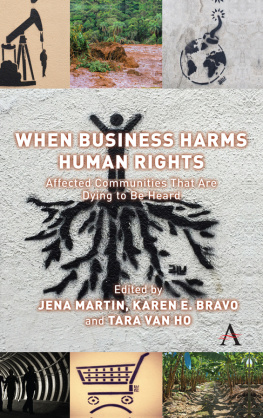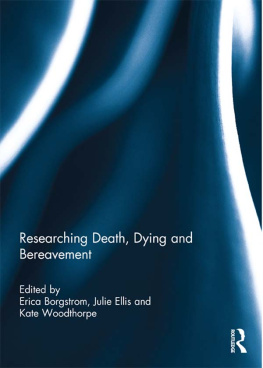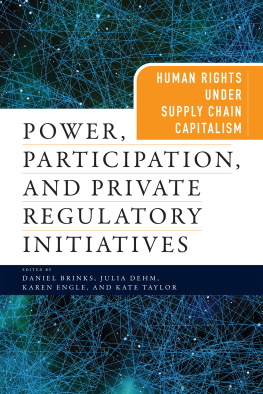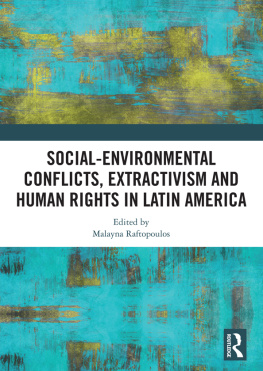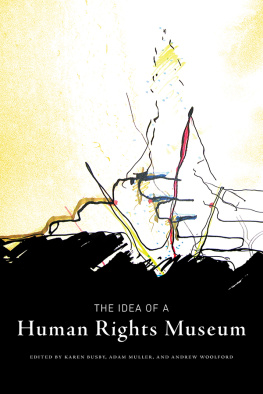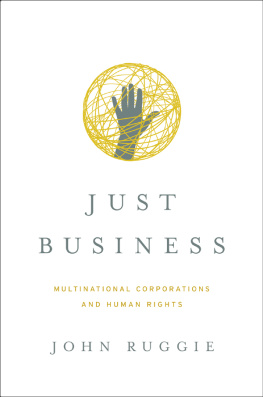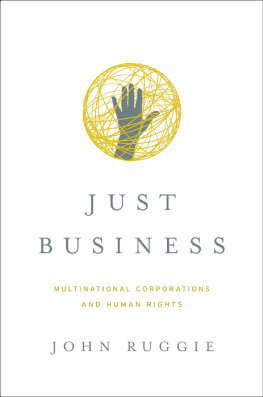When Business Harms Human Rights
When Business Harms Human Rights
Affected Communities that are Dying to Be Heard
Editors
Jena Martin
Karen E. Bravo
Tara Van Ho
Anthem Press
An imprint of Wimbledon Publishing Company
www.anthempress.com
This edition first published in UK and USA 2020
by ANTHEM PRESS
7576 Blackfriars Road, London SE1 8HA, UK
or PO Box 9779, London SW19 7ZG, UK
and
244 Madison Ave #116, New York, NY 10016, USA
2020 Jena Martin, Karen E. Bravo and Tara Van Ho editorial matter and selection; individual chapters individual contributors
The moral right of the authors has been asserted.
All rights reserved. Without limiting the rights under copyright reserved above, no part of this publication may be reproduced, stored or introduced into a retrieval system, or transmitted, in any form or by any means (electronic, mechanical, photocopying, recording or otherwise), without the prior written permission of both the copyright owner and the above publisher of this book.
British Library Cataloguing-in-Publication Data
A catalogue record for this book is available from the British Library.
ISBN-13: 978-1-78527-226-4 (Hbk)
ISBN-10: 1-78527-226-8 (Hbk)
This title is also available as an e-book.
Contents
Madeline Hung
Piergiuseppe Parisi and Gareth Sims
Daysheelyn Anne P. Brillo
Rajiv Maher and Adriana Bravin
Bellinda Chinowawa
Marianne Bertrand and Ariadna Tovar
Tara L. Van Ho with residents of Cajamarca, Ibague and surrounding areas
Cigdem Cimrin and Yucel Demiral
Jennifer D. Oliva with contributions from Jena Martin
Michael Clemens and Maria Isabel Cubides
by Jena Martin
For me, this book is personal.
At first glance, I grew up in a typical household. My mother was (and still is) a registered nurse (RN). My father was trained as an accountant. When we were younger, my brother and I went to school and then let ourselves into our apartment to wait for one of my parents to come home and make dinner (latchkey kids is the term they used back then). I went on to graduate high school, then college, then law school, before taking a job, first at a law firm, then at a government agency, before eventually ending up in my dream job teaching as a law professor in the United States.
And yet, in many ways, my life was not typical at all. When I was eight, my mother moved my brother and myself to Canada. After my mom and dad separated, I ended up living most of my teenage years with my dad and my stepmom, helping to take care of my younger siblings. We moved a lot. My dad and my stepmom became serial entrepreneurs, chasing various business opportunities (both in the United States and Canada), trying to provide for our ever-growing family. This provided for a less than stable life, but it was the only life I knew so I didnt mind. In the meantime, my mother was trying to make it as a part-time single mom, taking care of my older brother trying to put him in the best schools, trying to provide him with a solid foundation.
Although I didnt know it then, the growing intersection between businesses and the larger society around us was fundamentally shaping the world in which I lived. My mother, who has been practicing as an RN since 1959, has become first disillusioned and now downright cynical about the role that pharmaceutical companies and insurance companies have had on our right to health. Much of the reason why my father turned to running his own business is because of the outright discrimination he faced at the hands of accounting firms that didnt feel comfortable having a black face examine the books of their white shoe companies. As a teenager, my first full-time job that didnt involve working for one of my familys businesses was at McDonalds in Canada, where I worked my way up to becoming a shift manager while I was in college. In many ways, Im very grateful for that opportunity; the company gave me a scholarship that helped pay for one semester of college. But I also saw the inner workings of a publicly traded corporation up close, with all of its frustrations and foibles.
Watching my family struggle trying to eke out a life of stability amidst the chaos of uncertainty has fundamentally shaped who I am. Working for a mammoth-sized publicly traded corporation for four years has fundamentally shaped who I am. Working for the US Securities and Exchange Commission as an investigative attorney who examined the fraud that abounds in both public and private corporations all of these things have brought me to where I am today: a person who cares deeply about social justice. An attorney who tries to help small businesses grow. A professor who spends time examining the intersection of business and human rights.
So, why am I telling you all of this?
Because too often in the academic world we tend to look at phenomena and policy through divorced, seemingly objective lenses. Empirical writing has become increasingly fashionable in legal scholarship, providing facts and figures to substantiate our perspective. Let me be clear it is absolutely crucial that we do all of this empiricism and policy help us to understand what we are struggling with in a way that mere speculation and conjecture cannot.
As long as we dont forget the why.
And, for me, the why at the heart of what I do has been and will always be humanity. Trying to make the world a place where people can live with dignity, strive with respect and live their best life without irony is what motivates me to teach, practice and as it is here shine a light on those instances where we as a collective fall short of serving others.
As such, it is my hope that, as you read through these pages and hear the stories of those who struggle against incredible odds, their truths provide you with some insight into how businesses and humanity often intersect with the goal of helping you find your way.
Or your why.
The editors are incredibly grateful for the effort, work and dedication that the UN Working Group for Business and Human Rights has undertaken since its mandate began in 2011. In particular, the editors wish to thank Michael Addo (Working Group member from 2011 to 2019), Surya Deva (Working Group member from 2016 to present) and Anita Ramasastry (Working Group member from 2016 to present) for the guidance, support and mentorship they have provided to the editors, both individually and collectively. Their willingness to participate in conferences that discuss these important issues and their tireless efforts to advance the cause of business and human rights remain an inspiration to us. The conference that gave rise to this volume was hosted by the Aarhus University Department of Law (Denmark) and was generously funded by the Max Srenson Mindefond (Denmark) and the INTRAlaw Centre at Aarhus University. For their support in finding money for this conference and organizing it, we are deeply indebted to Jens Vedsted Hansen, Ellen Margrethe Basse, Bettina Lemann Kristiansen, Hans Henrik Edlund, Ann-Dorte Bruun Nielsen, Tine Sommer, Kirsten Jakobsen, Tinna Meyer and Inger Krog Nyholm.
Karen Bravos Acknowledgements
I am grateful to Jena Martin and Tara Van Ho, both of whom were essential to transforming this project from idea to reality. I am also grateful to all the contributors and narrators for their courage in sharing their experiences and perceptions. Funding from the Indiana University Robert H. McKinney School of Law has enabled me to work on this project.


